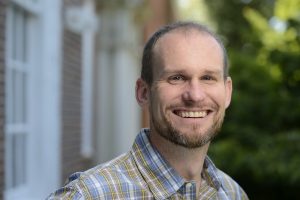
This award honors those teachers, researchers, and administrators who have consistently supported the personal and professional development of their students. Read Dr. Gray’s statement on mentoring below.

Mentoring is arguably my most important and most rewarding responsibility as a professor. I find deep satisfaction in seeing people around me learn, grow, think deeply, and develop to their full potential. Indeed, my fascination with this transformation in the university setting was one of my primary motivations to pursue a faculty career. My role as a mentor or advisor is to facilitate that personal and professional growth and to help students tap into their own core capabilities and values to find meaning and purpose in their studies, research, work and career.
My first approach to advising is to listen. Then I reflect to the students what I have heard, and I listen more. In this way I collect better data to know how to help, but more
importantly I can hear the students work through the challenges on their own. I find it helpful to ask guiding questions that focus the conversation on the student’s goals. As needed, I can serve as a source for affirmation of their identities and work, I can provide information that I have about additional resources, and I can help them clarify their values. I seek to help them take charge of their own learning and development, and to discover their own connections between the classes they are choosing, the experiences they are garnering through extra-curriculars and summer work, and the potential career and life paths. And I learn from them, as they come from very different backgrounds, families, and schools, and they have different values and aspirations.
Students learn by observing their mentors, and for this reason I work to live my core values and serve as a role model. Most importantly, I want them to strive for and achieve excellence in a sustainable and healthy manner. They must set high goals but also expect and manage setbacks to persist to achieve important and innovative outcomes. Thus, in research mentoring, I demonstrate how to approach a challenge. In our regular one-on-one research meetings, I ask mentees to bring a brief summary of their recent accomplishments and next-step plans, and we work through the details together. For example, in one recent meeting, a trainee and I examined an error message and dug through run logs and code to find clues to the problems. Another common research meeting is centered around a paper draft, where I have marked up a student’s draft, and we walk through my comments. I give rigorous and constructive critiques and explain why and how to be clear to a reader. For example, we will isolate one section, work through how to lead a reader logically and concisely through a set of data. We will then talk about the general rules to this part of writing, and I will challenge the student to continue on their own to rewrite other sections. Over multiple drafts and multiple papers, I see students grow to be strong and independent writers.
I realize that I do not have all the answers, and I seek good resources to share. I am quick to refer students to these sources valuable for core competencies, such as David Allen’s Getting Things Done for time management, George Gopen’s The Sense of Structure for writing, Kay and Shipman’s Confidence Code for managing expectations and psychology, and a document from my colleague Karen Fleming we call the “Slide Rules” for crafting clear presentations.
For teaching, we craft “learning objectives” and “student outcomes.” Similarly for research mentoring, I have a set of outcomes that I seek to instill. Students who work with me will develop a core set of technical competencies, ranging from molecular biophysics, computational modeling, software engineering, and biomolecular structure. They will also master research skills including how to choose the most impactful and tractable questions to ask or design objectives to pursue, how to troubleshoot and debug problems, and how to communicate their work in multiple formats. Additionally, I expect students to become fluent in time management, proposal writing, professionalism and networking, and career planning.
Beyond my focus on individual advising interactions, I work to identify structural factors that help or create barriers to student development. I hope that my work in the diversity-equity-inclusion area helps facilitate a better sense of belonging for students and higher quality interactions for formal and informal mentoring around campus. I distinctly remember the feeling when I first attended the Grace Hopper Celebration of Women in Computing: as a man, I felt outnumbered, I wondered what people thought of me being there and whether they would even talk to me. I noticed what it felt like to be ignored in conversations and how it made me feel when people did welcome me. Thus, in my role at Hopkins I strive in my personal interactions to be inclusive, and where called for, to show empathy to all students. And I work to create learning opportunities for me and other campus leaders to learn how to be more inclusive such as by improving awareness of our implicit biases or correcting our unintended microaggressions. Many inclusion issues are rooted in historical injustices that will take significant work and persistence to solve, but I believe each of us can play a positive role today in our current roles by leveraging our privileges and influences. I am grateful that my career allows me to answer a calling to develop people through my advising and mentoring.
Click here to learn more about the award (and others like it)